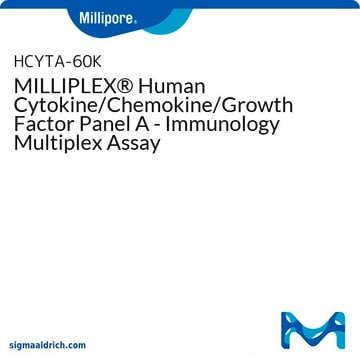HKI1MAG-99K
MILLIPLEX® Human Kidney Injury Magnetic Bead Panel 1 - Toxicity Multiplex Assay
The analytes available for this multiplex kit are: Calbindin, Collagen IV, Fatty Acid Binding Protein 1 (FABP1), GSTα, IP-10, Kidney Injury Molecule-1 (KIM-1), Renin, TFF-3, TIMP-1.
About This Item
Produits recommandés
Niveau de qualité
Espèces réactives
human
Fabricant/nom de marque
Milliplex®
assay range
accuracy: 73-117%
sensitivity: 0.010-6.473 ng/mL
(MinDC = 2SD)
standard curve range: 0.005-5 ng/mL
(IP-10)
standard curve range: 0.02-25 ng/mL
(Renin)
standard curve range: 0.05-50 ng/mL
(GSTα)
standard curve range: 0.05-50 ng/mL
(KIM-1)
standard curve range: 0.10-100 ng/mL
(TIMP-1)
standard curve range: 0.20-200 ng/mL
(Calbindin)
standard curve range: 0.34-350 ng/mL
(Collagen IV)
standard curve range: 0.49-500 ng/mL
(TFF-3)
standard curve range: 5.86-6,000 ng/mL
(FABP1)
inter-assay cv: <15%
intra-assay cv: <10%
Technique(s)
multiplexing: suitable
Méthode de détection
fluorometric (Luminex xMAP)
Conditions d'expédition
wet ice
Description générale
The MILLIPLEX® portfolio provides valuable research assays to investigate multiple biomarkers of kidney injury in human urine samples using the Luminex® xMAP® instrument platform. The analytes available for this multiplex kit are: Calbindin, Collagen IV, Fatty Acid Binding Protein 1 (FABP1), GSTα, IP-10, Kidney Injury Molecule-1 (KIM-1), Renin, TFF-3, TIMP-1.
Panel Type: Toxicity
Spécificité
There was no or negligible cross-reactivity between the antibodies for an analyte and any of the other analytes within a panel.
Application
- Analytes: Calbindin, Collagen IV, FABP1, GSTα, IP-10, KIM-1, Renin, TFF-3, TIMP-1
- Recommended Sample type: Urine
- Recommended Sample dilution: 1:2 in kit Assay Buffer Customers need to determine the optimal dilution factor for their samples. Our recommendations are based on urine samples from normal subjects.
- Assay Run Time: Overnight
- Research Category: Toxicity
Caractéristiques et avantages
Autres remarques
Informations légales
Clause de non-responsabilité
Mention d'avertissement
Danger
Mentions de danger
Classification des risques
Acute Tox. 3 Dermal - Acute Tox. 4 Inhalation - Acute Tox. 4 Oral - Aquatic Chronic 2 - Eye Dam. 1 - Skin Sens. 1 - STOT RE 2
Organes cibles
Respiratory Tract
Code de la classe de stockage
6.1C - Combustible acute toxic Cat.3 / toxic compounds or compounds which causing chronic effects
Certificats d'analyse (COA)
Recherchez un Certificats d'analyse (COA) en saisissant le numéro de lot du produit. Les numéros de lot figurent sur l'étiquette du produit après les mots "Lot" ou "Batch".
Déjà en possession de ce produit ?
Retrouvez la documentation relative aux produits que vous avez récemment achetés dans la Bibliothèque de documents.
Contenu apparenté
Novel kidney toxicity biomarkers expand options for acute nephrotoxicity detection. Multiplex assays measure multiple renal damage biomarkers in small sample volumes, minimizing time and costs. See how MILLIPLEX® multiplex kidney toxicity assays detected vancomycin-induced subacute nephrotoxicity in rat models.
Novel kidney toxicity biomarkers expand options for acute nephrotoxicity detection. Multiplex assays measure multiple renal damage biomarkers in small sample volumes, minimizing time and costs. See how MILLIPLEX® multiplex kidney toxicity assays detected vancomycin-induced subacute nephrotoxicity in rat models.
Novel kidney toxicity biomarkers expand options for acute nephrotoxicity detection. Multiplex assays measure multiple renal damage biomarkers in small sample volumes, minimizing time and costs. See how MILLIPLEX® multiplex kidney toxicity assays detected vancomycin-induced subacute nephrotoxicity in rat models.
Novel kidney toxicity biomarkers expand options for acute nephrotoxicity detection. Multiplex assays measure multiple renal damage biomarkers in small sample volumes, minimizing time and costs. See how MILLIPLEX® multiplex kidney toxicity assays detected vancomycin-induced subacute nephrotoxicity in rat models.
Notre équipe de scientifiques dispose d'une expérience dans tous les secteurs de la recherche, notamment en sciences de la vie, science des matériaux, synthèse chimique, chromatographie, analyse et dans de nombreux autres domaines..
Contacter notre Service technique









